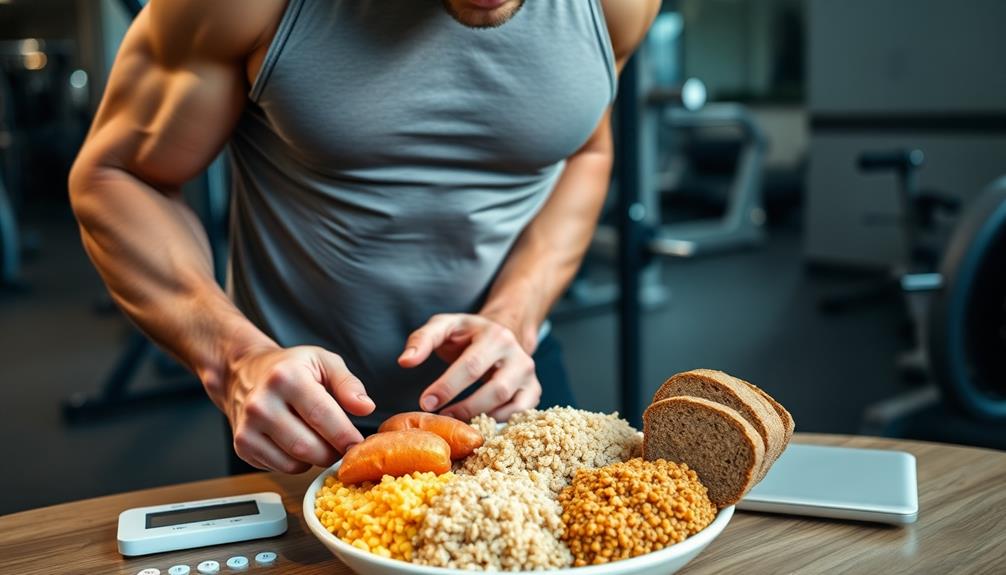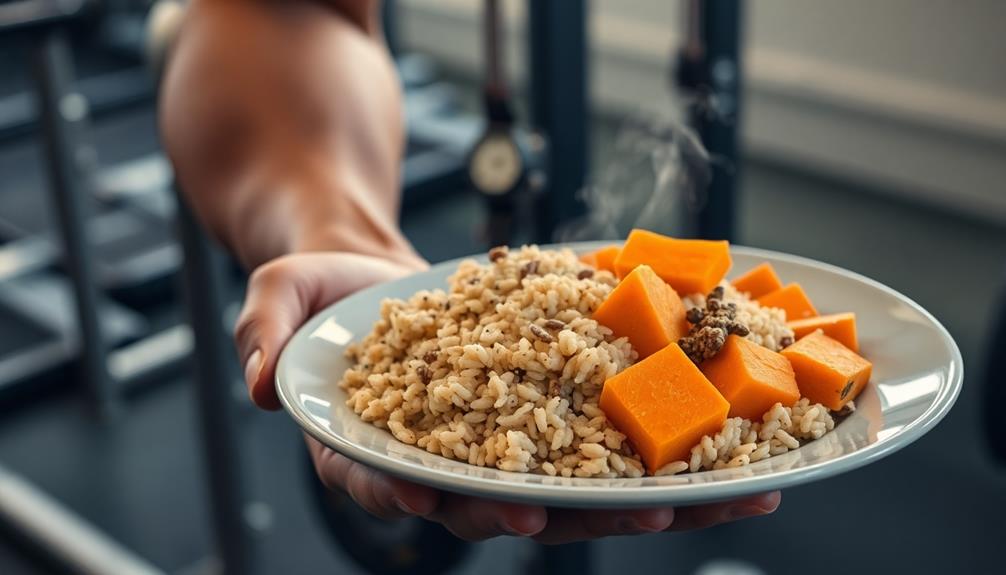To master carb intake during bulking, start by calculating your daily caloric needs and determining ideal macronutrient ratios. Choose high-quality carbohydrate sources like whole grains and starchy vegetables for sustained energy. Time your carb intake strategically, focusing on pre- and post-workout consumption for energy and recovery. Adjust your carb intake on training days, increasing by 20-30% around workouts and reducing by 10-15% on rest days. Monitor your progress and make adjustments as needed, avoiding common carb-loading mistakes. By following these steps, you'll optimize your carb intake for effective muscle growth and minimal fat gain. Dive deeper to fine-tune your approach and maximize results.
Core Insight
- Calculate your TDEE and aim for a 300-500 calorie surplus, adjusting carb intake to support muscle growth.
- Aim for 40-50% of total calories from carbs, focusing on complex carbohydrates for sustained energy.
- Time carb intake strategically, consuming more before, during, and after workouts for energy and recovery.
- Increase carb intake by 20-30% on training days, especially around workouts, for optimal performance and muscle support.
- Adjust carb intake based on progress, body response, and individual goals, focusing on high-quality sources throughout.
Calculate Your Daily Caloric Needs

To master your carb intake during bulking, first calculate your daily calorie needs. Figure out your Total Daily Energy Expenditure (TDEE), which is the number of calories you burn in a day. Start by calculating your Basal Metabolic Rate (BMR) based on your age, height, weight, and gender. Then, multiply your BMR by an activity factor that matches your lifestyle and exercise routine. After you know your calorie needs, think about adding fast-acting carbs to quickly replenish energy and recover after workouts.
Once you have your TDEE, add a calorie surplus to support muscle growth. Most people should aim for a moderate surplus of 300-500 calories per day. This helps you gain muscle steadily without adding too much fat. Keep in mind, these calculations are a starting point. You may need to adjust your intake based on your progress and how your body responds.
Determine Optimal Macronutrient Ratios

Once you know your daily calorie needs, it's time to figure out the best macronutrient ratios for your bulking phase. Most people aim for 40-50% carbs, 25-35% protein, and 20-30% fats. But you can adjust these numbers based on your body type and goals. When it comes to protein, choose high-quality sources that give you all the essential amino acids you need for muscle growth and recovery.
Here's how to calculate your macronutrient needs:
- Protein: Shoot for 1.6-2.2 grams per kilogram of body weight.
- Fats: Set aside 20-30% of your total calories for healthy fats.
- Carbohydrates: Use the rest of your calories for carbs.
So, if you're eating 3,000 calories a day, your macros might look like this:
- Protein: 180g (24% of calories)
- Fats: 83g (25% of calories)
- Carbohydrates: 383g (51% of calories)
Choose High-Quality Carbohydrate Sources

Choosing the right carbs is key when bulking. Go for complex carbs like whole grains, which give you long-lasting energy and important nutrients. Brown rice, quinoa, and oats are great options. They have lots of fiber to help with digestion and keep you feeling full.
Starchy veggies like sweet potatoes, squash, and beans are also good choices. They're full of vitamins, minerals, and antioxidants. And don't forget fruits! Berries, apples, and bananas have natural sugars and micronutrients your body needs.
Try to avoid refined carbs such as white bread, pastries, and sugary snacks. They might fit your macros, but they usually lack nutrients and can make your energy crash. Stick with high-quality carbs to reach your bulking goals faster.
If you have gluten sensitivities or prefer gluten-free foods, there are plenty of protein powders available without gluten. These can add variety to your nutrition plan and work well with your carb sources.
Time Carb Intake Strategically

Timing your carb intake right can help you build muscle and have more energy when bulking. Eat carbs before, during, and after workouts to fuel your training and recover better. 1-2 hours before exercising, have carbs that are easy to digest for quick energy. During long workouts, think about drinking a sports drink with carbs to keep going strong. After training, carb powders can be a great way to refill your energy stores fast and help your muscles recover.
Within 30 minutes post-workout, focus on fast-absorbing carbs to restock glycogen and start recovering. Spread out your other carbs evenly across your meals each day to keep your energy up. Don't forget carbs before bed – they can aid muscle recovery and growth overnight. Change your carb timing to fit your routine and needs, but always hit your daily carb goals for a successful bulk.
Adjust Carbs for Training Days

When you're bulking, it's important to adjust your carb intake based on whether it's a training day or rest day. On training days, eat 20-30% more carbs to power your workouts and help your muscles grow. Have most of these extra carbs before and after your workout. Post-workout recovery drinks are a great way to replenish carbs and support muscle gains after tough training.
On rest days when you're not working out, you can cut your carb intake by 10-15%. Stick mainly with complex carbs like oats, brown rice, and whole wheat bread for steady energy throughout the day.
To sum it up:
- Eat 20-30% more carbs on training days, mostly around workouts
- Use recovery drinks after training for carbs and muscle support
- Reduce carbs 10-15% on rest days
- Choose complex carbs over simple sugars
Monitor Progress and Make Adjustments

Tracking your progress is key when changing carb intake during a bulk. Write down your weight, body measurements, and strength gains. Check these numbers each week to see how your body is responding. If you're not getting the results you want, it's time to make changes. Think about adding fast carbs after your workout to help you recover and reach your bulking goals.
If you're not gaining weight or strength as fast as you want, add 25-50 grams of carbs per day. If you're gaining too much fat, lower your carbs by about the same amount. Make these changes slowly so your body can adjust.
Notice how you feel during workouts and throughout the day. If you're always low on energy, you might need to eat more carbs. Focus on whole food sources and change your intake based on what you need and what your goals are.
Avoid Common Carb-Loading Mistakes

Steer clear of these carb-loading mistakes to bulk up successfully. As you eat more carbs, watch out for these issues to gain muscle, not fat:
- Eating too many simple carbs like sugar
- Not getting enough fiber
- Eating carbs at the wrong times
- Not changing carb intake based on how active you are
Don't just eat sugary foods or white bread for carbs. Eat complex carbs from whole grains, fruits, and veggies instead. Think about using fast-acting carbohydrate powders after workouts for quick energy and recovery. Get enough fiber for good digestion and gut health. Spread out your carbs during the day, eating more around workouts. Change how many carbs you eat based on how much you exercised that day. Avoid these mistakes to use carbs wisely for effective bulking.
Frequently Asked Questions
How Long Should a Bulking Phase Typically Last?
You'll typically want to bulk for 3-6 months. It depends on your goals, body composition, and training experience. Keep track of your progress and adjust as needed. Don't forget to balance muscle gain with minimal fat accumulation.
Can I Bulk Effectively on a Vegetarian or Vegan Diet?
Yes, you can bulk effectively on a vegetarian or vegan diet. Make sure you're getting enough protein from plant-based sources like legumes, tofu, and seitan. Supplement with vegan protein powder if needed. Don't forget to track your calories and macronutrients.
Should I Take Supplements to Support Carb Intake During Bulking?
You don't necessarily need supplements for carb intake while bulking. Focus on whole food sources like grains, fruits, and starchy vegetables. If you're struggling to meet your calorie goals, a carb supplement might be helpful.
How Do I Prevent Excess Fat Gain While Increasing Carb Intake?
To prevent excess fat gain while increasing carbs, you'll need to monitor your overall calorie intake. Focus on complex carbs, time your intake around workouts, and maintain a slight caloric surplus. Don't forget to keep up with your resistance training.
What Are Signs That Indicate I'm Consuming Too Many Carbs?
You're likely consuming too many carbs if you experience rapid weight gain, bloating, increased sugar cravings, energy crashes, or mood swings. You might also notice excessive hunger, poor sleep quality, and difficulty concentrating throughout the day.

